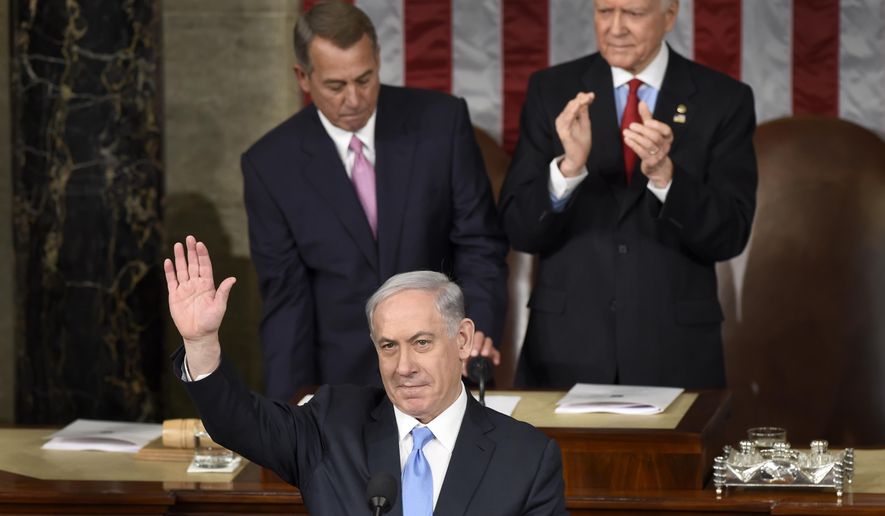Israeli Prime Minister Benjamin Netanyahu is monumentally wrong about the Iranian threat, an echo of his ill-conceived Sept. 12, 2002, exhortation to the House Foreign Affairs Committee to overthrow Iraq’s Saddam Hussein to secure “enormous positive reverberations” throughout the region.
The United States should ignore most everything the prime minister said Tuesday before Congress.
A policy of nuclear deterrence worked against the Soviet Union during the Cold War, including the Cuban Missile Crisis. It has worked without fail globally since the United States dropped nuclear bombs on Hiroshima and Nagasaki seven decades ago. At present, nuclear deterrence is the policy of the United States towards nuclear-armed Russia, North Korea, China, India, and Pakistan.
Nuclear deterrence should also be the United States policy towards Iran if it acquires a nuclear capability.
Iran’s nuclear ambitions are rational, not the offspring of unhinged thinking or a craving for Armageddon.
The United States nuclear arsenal approximates 4,800. Israel possesses about 200 nuclear weapons. Both are adversaries of Iran.
In 1953, the United States and Great Britain orchestrated the overthrow of Iran’s democratically elected Prime Minister Mohammad Mossedeq in favor of the Shah of Iran.
The United States has championed regime change in Iran ever since the 1979 Revolution replaced the Shah with Ayatollah Khomeini.
The United States and Israel have collaborated in the assassinations of Iranian nuclear scientists.
The United States initiated war against Libya to oust Muammar Gaddafi shortly after he abandoned weapons of mass destruction. The United States has refrained from military force against North Korea after it acquired a nuclear arsenal despite its foreign policy adventurism and unspeakable cruelty to its own people.
The Iranian people—even vocal critics of the Iranian regime like Nobel Prize winner Shirin Ibadi—do not oppose Iran’s nuclear program. By any rational benchmark it responds to a need for self-defense.
Iran’s foreign policy since the 1979 Revolution exhibits customary earmarks of Realpolitik. Ayatollah Khomeini negotiated a conclusion to the 1980-88 war with Iraq initiated by Saddam Hussein. Iran did not retaliate against Iraq’s use of chemical weapons or rockets against civilian targets. Iran has refrained from war against its neighbors, including Afghanistan and Iraq.
Iran’s restraint does not pivot on altruism, but on military, economic, social, and diplomatic realities.
The United States and Israel collectively dwarf Iran on land, sea, and air. Iran’s defense budget is but a tiny fraction of the Pentagon’s. Iran’s economy is crippled by massive corruption, plunging oil prices, international sanctions, state-run monopolies, capital flight, and a brain drain. Drug addiction is epidemic. And Iran’s minorities, for instance, Kurds, Azeris, and Baluchis, weaken national unity.
Iran’s Shiites are implacably opposed by Sunni populations throughout the Middle East who perceive them as infidels. Iran thus confronts Sunni adversaries in Saudi Arabia, the Persian Gulf statelets, Jordan, Yemen, Iraq, Syria, Afghanistan, and Lebanon. The Islamic State of Iraq and Syria competes with Saudi Arabia as Iran’s arch-enemy. Prime Minister Netanyahu erroneously maintained that Iran had gained dominance through Shiite proxies in Syria, Iraq, and Yemen. In all three nations, Shiites and Sunnis are engaged in civil war with no clear winner.
The Israeli prime minister correctly lectured that we should learn from history. Nuclear deterrence works, while regime change or intervention is chronically a cure worse than the disease.
On Sept. 12, 2002, Netanyahu admonished the United States to invade Iraq in the name of regime change and democracy. We followed his advice and ousted Saddam Hussein. But the result unwittingly made Iran the regional hegemon.
The United States 1953 overthrow of Prime Minister Mossedeq unwittingly set the stage for the Iranian Revolution and the ascendancy of a Shiite theocracy.
What would happen if the United States attacked Iran for acquiring a nuclear capability—the policy of President Obama and every 2016 Republican or Democratic presidential aspirant with the exception of courageous Senator Rand Paul?
Why roll the dice with the safety of the American people when nuclear deterrence has been proven to work?
For more information about Bruce Fein, visit brucefeinlaw.




Please read our comment policy before commenting.